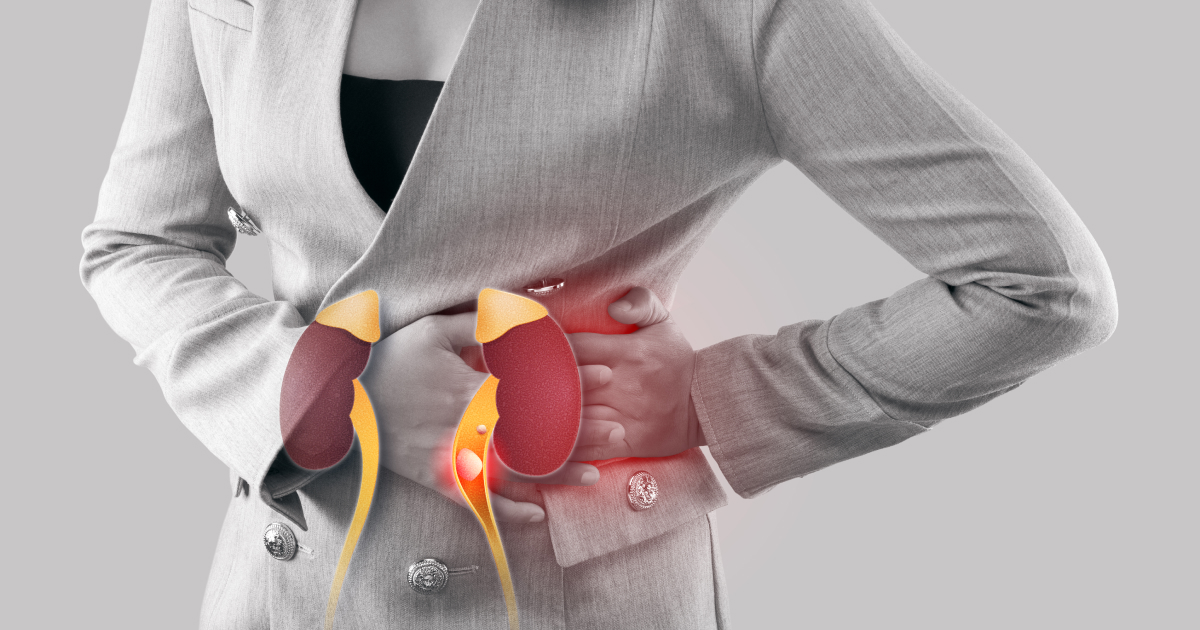
What is Kidney Failure?
Kidney failure occurs when the kidneys lose their ability to perform essential functions, such as filtering waste, regulating water and electrolytes, and maintaining acid-base balance.
How to Diagnose Kidney Failure?
Kidney failure is diagnosed through blood tests measuring waste products like creatinine and urea. Even a slight increase in creatinine levels can indicate significant kidney function loss. Online tools and apps can help estimate kidney function based on serum creatinine levels.
Can One Kidney Failure Lead to Overall Kidney Failure?
No, if one kidney fails or is removed, the remaining kidney can often handle the workload, so overall kidney function might not be significantly affected.
Types of Kidney Failure
- Acute Kidney Failure: Sudden loss of kidney function within hours to days, now known as Acute Kidney Injury (AKI). It is usually temporary and can often be reversed with proper treatment.
- Chronic Kidney Failure: Gradual, irreversible loss of kidney function over months to years, leading to End Stage Kidney Disease (ESKD) or End Stage Renal Disease (ESRD).
When kidney failure is diagnosed, over 50% of kidney function is already lost.
What is Acute Kidney Failure?
Acute Kidney Failure (AKF) is a sudden, temporary loss of kidney function that occurs over hours, days, or weeks. It is usually reversible with appropriate treatment.
- Causes of Acute Kidney Failure-: AKF can be caused by reduced blood flow to the kidneys (e.g., dehydration, blood loss), severe infections, sudden urinary blockages (e.g., kidney stones), or conditions like malaria, snake bites, and certain medications.
- Symptoms of Acute Kidney Failure: Symptoms vary but may include decreased urine output, swelling, loss of appetite, nausea, and severe issues like breathlessness or abnormal heart rhythms. Early stages might be asymptomatic and detected through blood tests.
- Diagnosis of Acute Kidney Failure: Diagnosis is confirmed via blood tests (elevated creatinine and urea), urine output measurements, urinalysis, and ultrasound. It’s crucial to investigate any suspicion of AKF.
Treatment
- Correct Underlying Causes: Address issues like infection or blockage.
- Drug Therapy and Support: Includes treating infections, avoiding nephrotoxic drugs, and using diuretics to manage fluid.
- Dietary Advice: Restrict fluid, potassium, and salt intake, while ensuring adequate nutrition.
- Dialysis: Temporary dialysis may be needed if kidneys don’t recover with treatment. It helps remove wastes and excess fluid.
Prevention
- Early Treatment: Address potential causes promptly.
- Avoid Nephrotoxins: Use medications cautiously.
- Monitor Kidney Function: Regular check-ups for at-risk individuals.
AKF often resolves with proper management, but delaying treatment can be life-threatening.
Dialysis may be needed for only a few days, but delaying it can be life-threatening.
Chronic Kidney Disease
What is CKD?
Chronic Kidney Disease (CKD) is a progressive and irreversible condition where the kidneys gradually lose function over months or years. It often remains stable with treatment, but if untreated, it worsens over time. CKD was formerly known as Chronic Renal Failure (CRF).
End-Stage Kidney Disease (ESKD)
ESKD is the final stage of CKD, with less than 10% of normal kidney function remaining. At this point, dialysis or kidney transplantation is needed for survival.
Causes of CKD
- Diabetes: The leading cause, responsible for about 35-40% of cases.
- High Blood Pressure: Accounts for nearly 30% of cases and worsens kidney damage.
- Glomerulonephritis: Inflammation of kidney tissues.
- Polycystic Kidney Disease: Hereditary condition with cysts in the kidneys.
- Other Causes: Aging, renal artery stenosis, urinary obstructions, certain medications, and infections.
Symptoms of CKD
- Stage 1: Normal GFR (90-100%), often asymptomatic but may show protein in the urine.
- Stage 2: Mild CKD (GFR 60-89%), symptoms may include frequent urination and high blood pressure.
- Stage 3: Moderate CKD (GFR 30-59%), possible symptoms include mild fatigue and elevated creatinine.
- Stage 4: Severe CKD (GFR 15-29%), symptoms can be severe or vague.
- Stage 5: End-Stage CKD (GFR < 15%), requires dialysis or transplantation.
Common Symptoms
- Loss of appetite, nausea, and vomiting.
- Fatigue, weakness, and weight loss.
- Swelling in legs, face, or around eyes.
- High blood pressure, sleep problems, and dizziness.
- Itching, muscle cramps, and frequent urination.
Diagnosis CKD is often diagnosed through:
- Blood Tests: Elevated creatinine and urea levels; low haemoglobin.
- Urine Tests: Presence of protein or albumin.
- Ultrasound: To assess kidney size and structure.
- eGFR Calculation: Estimates kidney function.
Treatment and Prevention
- Management: Address underlying causes, use medications, and follow dietary advice.
- Dialysis: May be needed in advanced stages to replace kidney function temporarily.
- Prevention: Early detection in high-risk individuals and managing conditions like diabetes and hypertension can slow CKD progression.
- eGFR Calculation: Estimates kidney function.
When to See a Doctor Contact a doctor if experiencing rapid weight gain, decreased urine output, severe swelling, shortness of breath, chest pain, confusion, or any sudden worsening of symptoms.
Small, contracted kidneys visible on ultrasound are a key indicator of chronic kidney disease.


